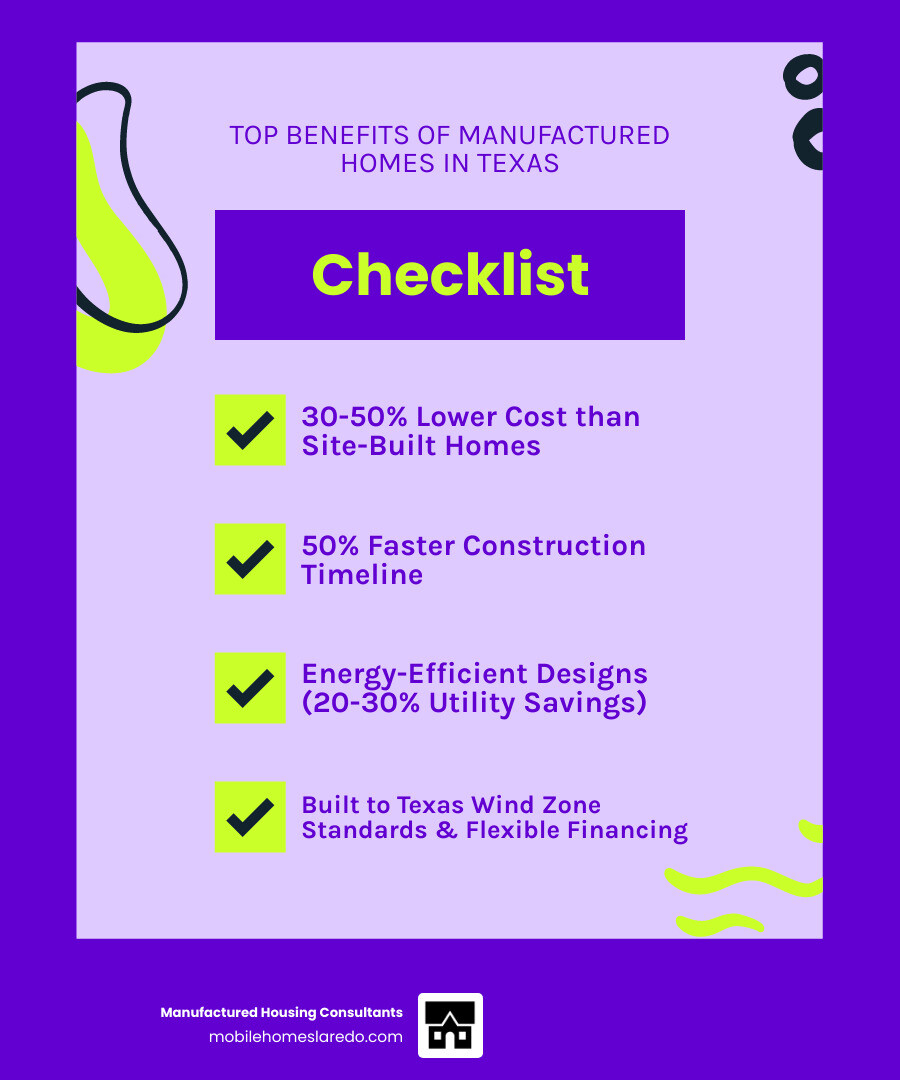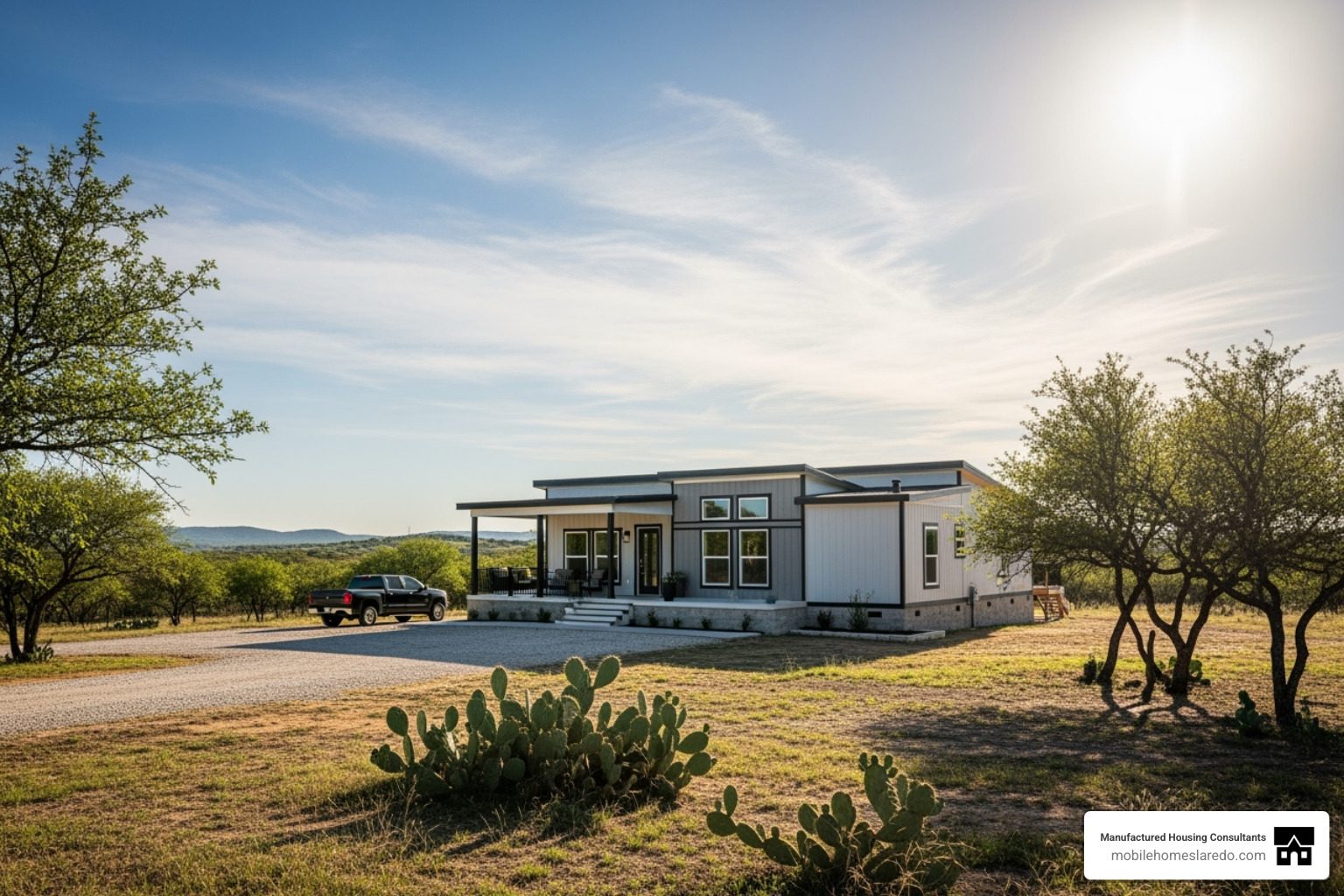Why Manufactured Homes in Texas Are Your Gateway to Affordable Homeownership
Manufactured homes Texas offer a practical path to homeownership that combines affordability, quality, and speed. If you’re exploring mobile and manufactured homes in the Lone Star State, here’s what you need to know:
Quick Answer: What Are Manufactured Homes in Texas?
- Affordable: New single-wides start around $25,999, and double-wides from $39,199 (before delivery/setup).
- Texas-Ready: Built with energy efficiency as a priority for the hot climate.
- Fast Construction: Factory building allows for quicker move-in than site-built homes.
- Flexible Designs: Options include single-wides (400-1,330 sq ft), double-wides (1,100-2,400 sq ft), and tiny homes (400-800 sq ft).
- Quality Assured: All homes meet federal HUD standards and Texas-specific building codes.
Texas has a wide selection of manufactured homes available, with top manufacturers building specifically for Texas conditions. Unlike traditional site-built homes, these homes are constructed in climate-controlled factories and then transported to your land.
The manufactured home industry in Texas has matured significantly, proving that modern manufactured homes offer the same quality and style as traditional homes, but at a fraction of the cost.
Whether you’re a first-time buyer, need financing with less-than-perfect credit, or simply want more home for your money, manufactured homes provide a realistic solution. With specialized financing, energy-efficient designs that can reduce utility bills by 20-30%, and homes built to withstand Texas weather, you’re not sacrificing quality for affordability.

Your Comprehensive Guide to Manufactured Homes in Texas
Buying a home is a major decision, and navigating the Texas housing market can feel overwhelming. From regulations to financing, there’s a lot to learn.
That’s why we created this guide. We’ll walk you through everything you need to know about manufactured homes Texas, from the types available to what makes them a smart choice. Whether you’re a first-time buyer or downsizing, we’re here to make your path to homeownership smooth.
Our goal is to give you the facts to make a confident decision. You’ll see how modern factory-built homes combine quality construction with incredible value, and how you can customize them to fit your lifestyle.
Understanding the Types of Manufactured Homes
When exploring manufactured homes Texas, you’ll find several housing options. The term “manufactured home” refers to homes built after June 15, 1976, in a factory under strict federal HUD code standards, ensuring consistent quality and safety.
Single-section homes (single-wides) are the most affordable option, built as one unit. Ranging from 400 to 1,330 square feet, they are perfect for individuals, couples, or small families and fit well on smaller lots.
Multi-section homes (double-wides or triple-wides) offer more space, from 1,100 to 2,400 square feet. Built in sections and joined on-site, they feature spacious, open-concept layouts that rival traditional homes, with multiple bathrooms and large kitchens.
Other factory-built options include:
- Modular homes: Built in sections to meet state and local codes, not federal HUD standards. Once placed on a permanent foundation, they are virtually identical to site-built homes.
- Tiny homes: Compact dwellings (400-800 sq ft) that emphasize efficiency and smart design for a simplified, affordable lifestyle.
- Prefab homes: An umbrella term for any home built off-site, including manufactured and modular homes, offering reduced construction time and consistent quality.
- Farmhouse and Cottage styles: These designs blend traditional charm with modern factory-built efficiency, with customizable exteriors and interiors.
One of the best parts of modern manufactured homes is the high degree of personalization. You can choose floor plans, finishes, and energy-efficient appliances to create a home that reflects your style at a fraction of the cost of a comparable site-built home.
Key Factors for Texas Homebuyers
When considering manufactured homes Texas, know how they handle our unique climate.
Energy efficiency is essential in Texas. Manufactured homes include features like improved insulation, high-performance windows, and efficient appliances to keep you comfortable and lower utility bills. Many homes offer improved energy packages, with some ENERGY STAR® certified options cutting utility bills by up to 20-30% or more. These features are investments that pay you back every month.
Wind zone ratings are crucial for safety. Manufactured homes are built to federal HUD wind zone standards (Zone I or Zone II in Texas) to handle strong winds. A licensed installer ensures your home is anchored correctly for your specific location. Leading manufacturers demonstrate their commitment to safety by participating in programs like the Weather-Ready Nation Ambassador initiative, building homes that stand strong when the weather gets rough.
Foundation requirements are also key. Texas regulations require a properly engineered anchoring system and at least 18 inches of clearance between the ground and floor joists for ventilation. In certain counties, footings must extend below the frost line. Proper drainage is also required to direct water away from the foundation.
Land preparation is the first step. The site must be cleared and leveled, with utilities (water, sewer/septic, electricity) and a driveway in place before the home arrives. Many dealers, including Manufactured Housing Consultants, offer free site inspections and help with land improvements to ensure everything is planned correctly.
Navigating Costs, Financing, and Regulations for Manufactured Homes in Texas
Understanding the full financial picture is key to buying manufactured homes Texas. Let’s break down the costs, financing, and regulations.
Understanding the Full Cost Picture
The base price is just the starting point. Be sure to budget for additional expenses to get your home move-in ready.
| Cost Category | Description | Typical Range |
|---|---|---|
| Purchase Price | Base cost of the home itself | Single-wide: $25,999+, Double-wide: $39,199+ |
| Delivery & Transportation | Moving your home from factory to site | $5,000-$10,000+ (varies by distance) |
| Setup & Installation | Professional installation, anchoring, leveling | $3,000-$8,000 |
| Foundation & Site Prep | Clearing land, installing piers/foundation, utility hookups | $5,000-$15,000+ |
| Utility Connections | Connecting water, sewer/septic, electricity, gas | $2,000-$10,000 |
| Permits & Inspections | Required local permits and inspections | $500-$2,000 |
| Property Taxes | Annual taxes (lower than site-built homes) | Varies by county and home value |
| Insurance | Homeowner’s insurance for manufactured home | $800-$1,500 annually |
Even with these costs, the total is significantly less than a comparable site-built home. Many dealers, including us, can help coordinate and bundle these services.
Financing Options That Work for Real People
Manufactured homes offer flexible financing, even for those who struggle with traditional mortgages.
- Chattel loans: The most common option. These personal property loans are easier to qualify for, often with lower credit scores and down payments.
- FHA loans: Backed by the government, these loans may be available with a credit score as low as 580 and a 3.5% down payment.
- VA loans: An excellent option for veterans and active military, potentially offering zero down payment and no private mortgage insurance.
- Conventional mortgages: Possible if the home is permanently installed on a foundation and classified as real property. They offer the best rates but have stricter requirements.
At Manufactured Housing Consultants, we specialize in financing for all credit types. We understand past credit challenges and work with lenders who know the manufactured housing market. Our FICO Score Improvement Program helps buyers strengthen their credit to qualify for better terms, setting you up for long-term financial success.
Texas Regulations and the Titling Process
The Texas Department of Housing and Community Affairs (TDHCA) oversees manufactured housing, from installation to titling.
Titling your home is like titling a vehicle. A new home’s Manufacturer’s Certificate of Origin (MCO) is submitted to get a Statement of Ownership (title). For a used home, the seller signs over the existing title. If you permanently attach the home to land you own, you can convert it to real property, which can increase its value and improve financing options.
Installation standards in Texas are strict and handled by licensed installers. They follow detailed regulations for anchoring, foundations, and utility connections. An inspector verifies the work meets state standards before you can move in. A reputable dealer like Manufactured Housing Consultants handles the paperwork and coordination, making the process smooth and ensuring everything is done right.
Choosing a Texas-Based Manufacturer and Dealer for Your Manufactured Home
Choosing the right dealer is perhaps the most important decision you’ll make. They guide you through the entire process, from selection to installation.
Local expertise is crucial. A Texas-based dealer understands our climate, regulations, and has relationships with local installers. They can guide you to homes built for Texas conditions. At Manufactured Housing Consultants, we’re “Built By Texans, For Texans.” We live here too and understand what it takes to own a home in this state.
Look for dealers with a wide selection and transparent pricing. We work with 11 top manufacturers, giving you access to hundreds of floor plans. We also guarantee the lowest prices—if you find the same home for less from another authorized dealer, we’ll beat it.
Financing expertise is a must. We specialize in financing for all credit types and offer a FICO Score Improvement Program to help buyers qualify for better terms.
Warranty and after-sales support protect your investment. A good dealer explains the manufacturer’s warranty and remains available to help after the sale.
Key questions to ask any dealer:
- How long have you been in business?
- Which manufacturers do you represent?
- Can you provide customer references?
- What financing programs do you offer?
- What is included in your quoted price?
A reputable dealer welcomes questions and provides honest answers. Customer testimonials tell the real story. We’re proud that many of our buyers come from referrals, which speaks to the positive experiences we provide. The right dealer is a partner who makes you feel informed and confident.


